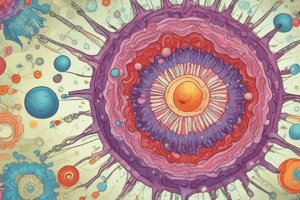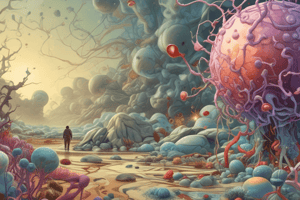Podcast
Questions and Answers
What is the primary characteristic of the innate immune system?
What is the primary characteristic of the innate immune system?
- It specifically targets individual pathogens.
- It adapts its response based on previous infections.
- It provides a broad and rapid response to microbial structures. (correct)
- It requires prior exposure to a pathogen to be effective.
Which of the following is NOT a component of the innate immune system's external defenses?
Which of the following is NOT a component of the innate immune system's external defenses?
- Natural killer cells (correct)
- Skin
- Saliva flushing action
- Respiratory epithelium
Which mechanism is involved in the mechanical barriers of the innate immune system?
Which mechanism is involved in the mechanical barriers of the innate immune system?
- Cytokines
- Lysozyme production
- Antimicrobial peptides
- Mucociliary escalator (correct)
What role do antimicrobial peptides play in the innate immune system?
What role do antimicrobial peptides play in the innate immune system?
What is the role of the flushing action of saliva, tears, and urine in the immune system?
What is the role of the flushing action of saliva, tears, and urine in the immune system?
What is the main focus of Lecture 15?
What is the main focus of Lecture 15?
What are bioassays used for in the context of mammalian biotechnology?
What are bioassays used for in the context of mammalian biotechnology?
Which of the following is NOT explicitly mentioned as an aspect of bioassays?
Which of the following is NOT explicitly mentioned as an aspect of bioassays?
What is one example of a substance that mimics components of the immune system as mentioned in the content?
What is one example of a substance that mimics components of the immune system as mentioned in the content?
Which lecture discusses contamination control?
Which lecture discusses contamination control?
When is the 'Reading Week' scheduled according to the schedule?
When is the 'Reading Week' scheduled according to the schedule?
What characterizes innate immunity?
What characterizes innate immunity?
Which of the following is a feature of acquired immunity?
Which of the following is a feature of acquired immunity?
Which of the following serves as the first line of defense in the immune system?
Which of the following serves as the first line of defense in the immune system?
How does the innate immune system respond to invading pathogens?
How does the innate immune system respond to invading pathogens?
What is the role of natural killer cells in the immune response?
What is the role of natural killer cells in the immune response?
What distinguishes the primary line of defense from the secondary line of defense in the immune system?
What distinguishes the primary line of defense from the secondary line of defense in the immune system?
What is the function of an inflammatory response in the immune system?
What is the function of an inflammatory response in the immune system?
Which of the following best describes the relationship between innate and acquired immunity?
Which of the following best describes the relationship between innate and acquired immunity?
What is the primary role of normal flora in the body?
What is the primary role of normal flora in the body?
Which of the following is NOT a component of internal cellular defenses?
Which of the following is NOT a component of internal cellular defenses?
Which immune cells are known as antigen presenting cells?
Which immune cells are known as antigen presenting cells?
What function do cytokines serve in the immune system?
What function do cytokines serve in the immune system?
What are complement proteins primarily responsible for?
What are complement proteins primarily responsible for?
Which component is crucial for phagocytosis of microbes?
Which component is crucial for phagocytosis of microbes?
How do Natural Killer cells function in the innate immune response?
How do Natural Killer cells function in the innate immune response?
What is the role of cytokines in relation to other immune cells?
What is the role of cytokines in relation to other immune cells?
What process do neutrophils primarily perform?
What process do neutrophils primarily perform?
Which of these is involved in the mechanism to stop bleeding after injury?
Which of these is involved in the mechanism to stop bleeding after injury?
What role do Interferons (IFNs) play in the immune response?
What role do Interferons (IFNs) play in the immune response?
Which of the following cells is a key player in the innate immune response against tumor cells?
Which of the following cells is a key player in the innate immune response against tumor cells?
What type of cytokine is primarily produced by virus-infected cells?
What type of cytokine is primarily produced by virus-infected cells?
Which immune response component is considered the first line of defense?
Which immune response component is considered the first line of defense?
What is a key function of Tumor Necrosis Factor (TNF)?
What is a key function of Tumor Necrosis Factor (TNF)?
What type of immune response do macrophages contribute to?
What type of immune response do macrophages contribute to?
Which interleukin is primarily secreted by T-lymphocytes?
Which interleukin is primarily secreted by T-lymphocytes?
What happens to neighboring cells when they are exposed to Interferon (IFN)?
What happens to neighboring cells when they are exposed to Interferon (IFN)?
Flashcards
What is a Bioassay?
What is a Bioassay?
A test that measures the potency of a substance by its effect on living cells or tissues.
How do Bioassays relate to the immune system?
How do Bioassays relate to the immune system?
Bioassays often involve mimicking or stimulating components of the immune system, such as monoclonal antibodies or interleukins. This is important for understanding how drugs or bioactive peptides affect the immune response.
Why is understanding the immune system important for Bioassays?
Why is understanding the immune system important for Bioassays?
Since many drugs and peptides interact with the immune system, having a basic understanding of its components and functions is crucial for developing and analyzing bioassays.
Immunity
Immunity
Signup and view all the flashcards
Innate Immunity
Innate Immunity
Signup and view all the flashcards
Adaptive Immunity
Adaptive Immunity
Signup and view all the flashcards
Key Features of Innate Immunity
Key Features of Innate Immunity
Signup and view all the flashcards
External Defenses
External Defenses
Signup and view all the flashcards
Internal Defenses
Internal Defenses
Signup and view all the flashcards
Humoral Response
Humoral Response
Signup and view all the flashcards
Cell-mediated Response
Cell-mediated Response
Signup and view all the flashcards
Innate Immune System
Innate Immune System
Signup and view all the flashcards
Mechanical Factors
Mechanical Factors
Signup and view all the flashcards
Chemical Factors
Chemical Factors
Signup and view all the flashcards
Normal Flora
Normal Flora
Signup and view all the flashcards
Mucociliary Escalator
Mucociliary Escalator
Signup and view all the flashcards
Complement Proteins
Complement Proteins
Signup and view all the flashcards
Coagulation Proteins
Coagulation Proteins
Signup and view all the flashcards
Cytokines
Cytokines
Signup and view all the flashcards
Neutrophils
Neutrophils
Signup and view all the flashcards
Macrophages
Macrophages
Signup and view all the flashcards
Natural Killer (NK) Cells
Natural Killer (NK) Cells
Signup and view all the flashcards
Dendritic Cells
Dendritic Cells
Signup and view all the flashcards
Antigen Presenting Cells (APCs)
Antigen Presenting Cells (APCs)
Signup and view all the flashcards
Neutrophils' Role
Neutrophils' Role
Signup and view all the flashcards
Macrophages' Role
Macrophages' Role
Signup and view all the flashcards
NK Cells' Target
NK Cells' Target
Signup and view all the flashcards
What are Cytokines?
What are Cytokines?
Signup and view all the flashcards
Interferons (IFN)
Interferons (IFN)
Signup and view all the flashcards
Interleukins (IL) Roles
Interleukins (IL) Roles
Signup and view all the flashcards
Tumour Necrosis Factor (TNF)
Tumour Necrosis Factor (TNF)
Signup and view all the flashcards
IFN's Mechanism
IFN's Mechanism
Signup and view all the flashcards
Study Notes
Week Schedule
- Week 1: Lecture Module Introduction
- Week 2: Lecture 1 (Mammalian cells), Lecture 2 (Lab layout, equipment, materials)
- Week 3: Lecture 3 (Contamination control), Lecture 4 (Contamination control)
- Week 4: Lecture 5 (Contamination control), Lecture 2, 3, 4 and 5 recap, sample assessment questions
- Week 5: Lecture 6 (Nutrient uptake), Lecture 7 (Nutrient uptake), sample assessment questions
- Week 6: Lecture 8 (Biology of Culture Cells), Lecture 9 (Cell culture media)
- Week 7: Lecture 10 (Cell culture media - postponed), Lab 3 data analysis, reading week
- Week 8: Lecture 10 (Cell culture media), Lecture 11 (Cell Culture Media)
- Week 9: Lecture 12 (Growing mammalian cells), Lecture 8, 9, 10 and 11 recap, sample assessment questions
- Week 10: Lecture 13 (Monitoring growth), Lecture 14 (Cryopreservation), Lecture 12, 13, and 14 recap, sample assessment questions
- Week 11: Lecture 15 (Innate immune response), Lecture 16 (Adaptive immune response & Bioassays)
- Week 12: Lecture 15 and 16 recap, sample assessment questions, revision
Immune System Overview
-
What is immunity? Study of how the host protects against disease and the cells of the immune system's reaction to foreign substances.
-
Lecture Overview: Introduction, innate immune system discussion, conclusion
-
Bioassays: Analytical methods to determine the concentration or potency of a substance based on its effect on living cells or tissues. Used in studying disease, drug development, and more.
-
Innate Immune System (Key Features):
- Also known as native immunity
- Fully functional at birth (before infection)
- Non-specific to a particular pathogen
- Reacts to pathogens based on their structure
- First line of defense
- Doesn't change with repeated exposure
- Response is broad and rapid
-
External Defences:
- Mechanical (Skin, Respiratory Epithelium, flushing action)
- Chemical (Antimicrobial peptides, HCL, Lysozyme)
- Biological (Normal flora)
-
Internal Defences:
- Cellular (Neutrophils, natural killer cells, macrophages/monocytes, dendritic cells)
- Extracellular (Cytokines, complement, coagulation)
-
Important Cells (Innate):
- Dendritic cells: Antigen-presenting cells, connect innate and adaptive responses
- Macrophages: Phagocytosis of microbes, inflammatory response, antigen presentation, kill hundreds of bacteria
- Natural Killer (NK) Cells: Important part of innate system, kill bacteria, virus infected cells, and cancer cells
- Neutrophils: Phagocytize microbes, antigen presentation, trigger inflammatory response.
-
Cytokines: Large group of proteins secreted by immune system cells. Coordinate immune response activities. (e.g., Interferons).
-
Interferons (IFN): Key anti-viral proteins. Produced by virus-infected cells to warn neighboring cells. Inhibit virus replication.
Studying That Suits You
Use AI to generate personalized quizzes and flashcards to suit your learning preferences.





